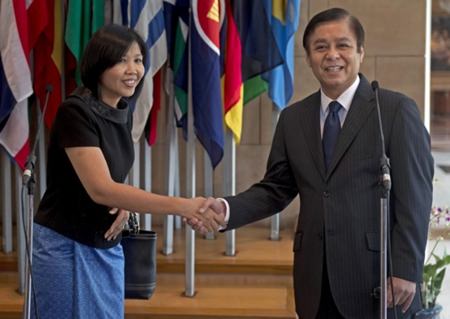The Foreign Affairs Ministry of Thailand has told the Cambodian side that it has no policy to crack down on Cambodian workers.
The Permanent Secretary for Foreign Affairs, Mr. Sihasak Phuangketkeow, in his capacity as Acting Minister of Foreign Affairs, invited Eat Sophea, the Ambassador of Cambodia to the Kingdom of Thailand, for a meeting on 17 June, 2014, during which Mr. Sihasak clarified the alleged reports of the crackdown on Cambodian workers by the Thai authorities, saying such rumors were false as the Thai side had no intentions of doing so. The rumors have prompted a mass exodus of Cambodian workers from Thailand to their home country.

Mr. Sihasak reiterated that those rumors were unfounded, saying that the National Council for Peace and Order (NCPO)’s policy was to promote orderly flow and proper employment of foreign workers in Thailand in order to prevent labor exploitation and abuses and human trafficking as well as protecting human rights.
Sihasak said he hoped the clarification would help correct any misunderstanding and allay fears among the workers and that Thailand appreciated the contribution of foreign workers to the Thai economy. It was, therefore, important that the management of foreign labor be properly handled to ensure they receive the full benefits and welfare protection according to the Thai laws.
Foreign workers who entered Thailand legally and those who are awaiting national identity verification from the authorities can continue to work as normal in Thailand, the Permanent Secretary added.
In order to facilitate the return of undocumented workers to Cambodia in a safe and orderly manner, the Acting Foreign Minister and the Ambassador of Cambodia have reaffirmed that the two countries will closely work together.
In addition, undocumented workers have been advised to seek employment through proper channels provided under the Thai-Cambodian MOU on Cooperation on the Employment of Workers in order for them to be entitled to proper welfare protection.




